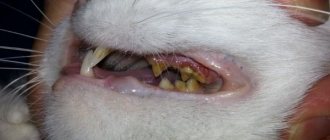Cats are famous hunters. Country cats enjoy catching mice, and house cats enthusiastically participate in games where you need to grab something. But what if the owner’s hands become the prey for the cat’s sharp teeth?
In this article we looked at why cats can bite their owner's hands. You will learn how to wean your cat from the bad habit of showing its teeth and how to recognize the animal’s readiness to bite you.
Cat psychology
Every fluffy and affectionate cat has the blood of a warlike hunter flowing in it. A prey that looms before your eyes will definitely awaken the hunting instinct in even the calmest cat. It’s good when this victim is a toy or a small rodent. It is much worse if the owner’s hands play such a role. But other aspects of cat psychology also influence the bad habit of biting.
Cats have a keen memory, and you could write a dissertation on the vindictiveness of furry cats. Therefore, your pet’s aggressive behavior is often associated with psychological trauma and unpleasant memories in the animal’s life. For example, if you adopted a cat from a shelter, its biography may contain sad facts. A cat that has been beaten by its previous owner will reflexively bite in an attempt to protect itself. Your hand reaching out to pet the cat may be perceived by the animal as a threat.
Your cat may perceive you as a threat.
Cats are also social animals that love attention. It may seem to you that you were bitten just like that, then put yourself in the place of the animal. It managed to meow, wag its tail displeasedly, and look at you with a bewitching gaze. And you don't react. And he has one last chance to remind him of his existence - to bite! After all, the owner will definitely notice her.
Personal boundaries in the lives of cats are also important. Some breeds are tolerant of children's attention, tail pulling, and loud laughter. But if there is no reaction to the cat’s signals of dissatisfaction, she can only defend herself in ways known to her.
Norm or pathology
A cat is a domesticated animal. Nature designed them as hunters, and genes sometimes make themselves felt. That's why they have sharp claws and thin teeth that can pierce the skin with lightning speed. It is normal for an animal to use your own hunting tools. But, of course, it is more convenient when a toy or small rodents, rather than the owner’s hands, become the treasured prey for a cat. Therefore, if you have adopted a stray cat, get ready: biting is natural for him. Lack of education and the habit of keeping your teeth to yourself will inevitably lead to bites.
If a cat has been raised since childhood as a gentle and neat pet, then aggression and regular bites on his part are abnormal.
the gray cat aggressive bites the hand
A sudden change in behavior may indicate illness. For example, something hurts your cat, and while stroking you touched the sore spot. The acute pain frightened him, and he reflexively defends himself and drives away the external irritant. If bites recur, take your pet to the vet.
Reasons for unexpected aggression
Unexpected cat aggression is such only for owners. Cats always have motives and if they could talk, they would have an argument for every bite. A cat may bite because it is tired. If a cat fell into the hands of children who endlessly pulled its tail, its patience could run out. Don't let children bully your pet. For cats, their personal boundaries and sense of freedom are important.
The causes of bites can also be harmful. Castration or sterilization will help. After these procedures, the animal becomes noticeably calmer.
Cats have an unpleasant character trait that should be taken into account in life together - vindictiveness. Did you give your pet a bath the day before the bite? Or maybe they yelled at him for stealing a chicken from the table?
Perhaps the cat is taking revenge on you for water procedures
But there are also less obvious reasons for cat revenge. Here your pet obediently lies on your lap and enjoys stroking. And then behind your back he sees another pet, with whom they had a conflict the day before. The cat begins to feverishly think through a plan for revenge, and your hand knocks him out of his thoughts. As a result, the cat bites your fingers and runs towards its opponent. It is difficult to trace such a chain of thoughts, but with a careful approach it is possible.
The owner's observation is important in solving the problem of a biting cat. After all, there are more probable reasons for this behavior than it seems.
Aggressive behavior
Aggressive behavior can be a consequence of a harmful nature. Do you have a friend who is always dissatisfied with everything? There are the same among animals. If the cause of the bites is a hot-tempered character, then the first signs of the animal’s complex temperament will appear at a young age.
Siamese cats are aggressive and love to bite
Aggression is often a personality trait of some breeds. Elegant Siamese are unfriendly and choose only one person as a confidant. The attention of other family members irritates them and provokes aggression. Abyssinian and savannah cats are attractive due to their mobility. But, like Siamese, they are freedom-loving and are not ready to show tenderness to people. Take these nuances into account. If there are children in the house, choose a non-conflict breed. Beauty and grace may hide the habits of a real predator.
Static electricity is to blame
Stroking a cat is calming and relaxing. And here we don’t mean an animal, but a person! After a hard day at work, it’s so nice when your furry pet lays down on the owner’s lap and begins to caress. But if you have long sleeves that slide through your cat's fur when touched, static electricity may form. Such actions cannot result in a serious discharge. The cat will not be harmed, but it will be scared. The bite will be a reaction to unexpected sensations.
Static electricity may appear in contact between wool and clothing.
Sexual characteristics
Cats have more reasons to bite than cats. The main one is the protection of offspring. Cats have a developed maternal instinct; they feed kittens, warm them and protect them from the outside world.
Cats are good mothers and protect their children.
The owner’s innocent desire to weigh or examine the kitten can be met with aggression from the mother, so be careful with the mother in labor. If a trusting contact is not established with the pet, the owner will be perceived as a threat to its offspring.
The cat wants to dominate
Cats passionately guard their territory. Leaving their smell throughout the apartment, they claim their rights to it. If you engage in education, then the seizure of territory will end there.
Remind your cat who's boss
Pampered cats will want to go further. They will begin to set their own rules and fight for them. The victim of this battle for leadership will be the owner's hands, which will inevitably fall under the distribution. It won't go well for guests who disturb the cat's routine and bring someone else's scent.
Raise the animal and don't let it forget who's boss. Ignoring this behavior will lead to aggression and serious injury.
Other reasons
Before you begin investigating cat bites and collecting evidence, you need to take into account all the circumstances of your pet's crime. There are many factors that provoke this behavior, and they are not always obvious to the owner.
- Fright. The bite may be a reaction to fear or stress. An animal will be impressed by a move, strangers or the appearance of a new animal in the house. It is better to give the cat time to adapt to new circumstances.
- Irritants. Let's say you like to treat your cat to food from the table. But punish her for stealing. She has an internal conflict: why is it possible to eat sausage from your hands, but not to steal a piece from the table? This begins to irritate the animal, which cannot establish a cause-and-effect relationship. And all that remains for him is to express his indignation with a bite. Other pets and obsessive attention can also irritate the animal.
- Games. Active games with a kitten seem cute and harmless until it develops strong claws and teeth.
Get toys for your cat that you can bite.
Therefore, stop attempts to bite from an early age. To entertain your animal, it is better to choose toys that can be chewed. It will splash out its hunting instinct, and your hands will remain intact.
- Smells. Cats have a developed sense of smell, so new smells can make them angry. For example, strong citrus scents, essential oils and cosmetics, garlic and household chemicals are too harsh for a cat's delicate nose. The cause of anger will also be odors that are elusive to humans and accessible only to cats.
Cats have a developed sense of smell, so strong smells can make them angry.
The smell of other animals will cause resentment. When cleaning, do not use household chemicals with a strong aroma. If you are planning a renovation, then take the cat out of the house while using varnishes and paints.
- Finding personal space. Give your cat your own corner. This should be a place where she feels safe. If there is no personal space, the cat will try to arrange it on its own. She will not be able to warn the owner about this. Therefore, without knowing it, you may accidentally destroy an impromptu cat bed. In response to actions that the cat considers barbaric, it may bite. The cat will also be upset by unfamiliar smells in her house. It is better not to touch the cat's bed without reason and not to allow guests to do this.
Causes of bites and scratches
There are many explanations for why cats bite. Animal psychologists understand animal behavior and can help explain every pet behavior.
- Health comes first among the reasons why a pet bites. When a person strokes a pet, he touches a sore spot. Then the cat will try to drive the owner away in every possible way so that there is no discomfort. This behavior can even be caused by flea or tick bites. Take your pet to a veterinarian.
- Why a cat bites its owner is explained as an expression of love. In the cat world, friendly relationships are usually expressed by light nipping. This behavior can be distinguished from aggression by alternating biting with hand licking. The cat also purrs and rubs her body against her hand.
- When you get tired of communicating with the owner. These are wayward animals; if they want to mind their own business, they will unceremoniously drive away a person.
- Conversely, biting means the animal is in a playful mood. When a kitten is bored, he asks for attention in any way possible.
- A cat bites and scratches when it feels unsafe. Representatives of the cat family do not like to be stroked on the stomach, neck and tail area. In this case, the cat tenses its entire body, raises the hair on the back of its neck, and actively swings its tail.
- When you are very excited. This happens during active games with a person.
- Adult males behave aggressively when sexual desire begins. Usually this is March - April. Cats tend to be aggressive during estrus or pregnancy.
- A lambing female attacks people in order to protect her offspring. She hisses, covers the kittens with her body, and if you bring your hands to them, she can severely scratch or bite.
causes of bites
The most dangerous condition, why pets begin to behave aggressively and bite, is rabies. This is an infection that is spread by street animals. Rabies is deadly not only for a sick cat or dog, but also for humans.
A cat bites just like that - why?
Cats may bite their owner's hand out of boredom. Life in an apartment is not varied, so there are few entertainment options. Busy owners may not pay attention to the animal, but this does not make the hunting instinct disappear. And if it cannot express its emotions in the game, then an unexpected bite remains the only entertainment.
Give your cat attention and play with her. Cats seem independent, but it is difficult for them to entertain themselves in an apartment. Set up a scratching post with a hanging fishing rod toy so your animal doesn't get bored while you're away from home.
How to tell if a cat is getting ready to bite
No one likes to suddenly feel cat teeth quickly digging into their skin.
Hissing and flattened ears are a sign of an impending bite.
To understand that such trouble is about to happen, learn to read the signals. Before biting, the cat stops purring and flattens its ears. Rapid movements of the tail also indicate growing anger. The most well-known sign of cat dissatisfaction is hissing. If a cat begins to hiss when stroking or playing, it is better not to touch it.
A cat bites your hands - how to stop it
Bites cannot be tolerated. Harmless attempts to grab fingers with your teeth can develop into painful bites, so the cat needs to be weaned from this habit.
Agree with your family not to tease the animal. Prepare toys: feathers and strings glued to a stick will do. The animal will get used to the fact that the owner’s hands are not a toy or a possible victim.
There is an effective way to wean a cat from biting. Cats don't like loud sounds. Accompany every attempt to bite your fingers with a loud sound. This could be a clap or a rattle. The sound should be heard every time the cat bites. With the owner's patience and regularity, the cat will develop an unpleasant association with biting, and it will stop doing so.
You can train a wayward purr by splashing water or throwing a wet towel or pillow over it. The main thing is that your actions are consistent and uncompromising.
Why does a domestic cat attack and bite its owner?
The cat scratched its owner's hand until it bled, why?
Before weaning a cat from aggressive behavior, you need to understand why he behaves this way. Our pets are not us, and they cannot bite or scratch us for no reason.
There can be several reasons for aggression.
Pain
The animal is in pain . One of the reasons for aggression may be illness or injury in the cat. When the owner tries to pick up his animal and it experiences pain, the pet may bite him in response. Or if the owner stepped on the cat’s paw or crushed it, it is logical that the pet, in defense, screams, hisses, bites and scratches.
When a cat experiences severe pain, it instinctively hides. At such moments, he can attack the owner.
If the cat was active and affectionate, and one day began to hide in a dark corner. When you try to take her out of there, she violently shows aggression. In such a situation, it is urgent to take your pet to a doctor for examination.
Fear
When a cat is afraid of something, aggression can act as a defensive reaction.
When a cat is very scared, its behavior can become aggressive. This is his quiet reaction and survival instinct.
If your children like to forcibly pet a cat or torment it, then in return they will only get vinegar and scratches. To calm your pet, you just need to move away from him what scares him.
Cats like it when their opinions are respected . If your pet comes to you for attention, it will be sweet and affectionate. If you forcefully pet him, this will cause a lot of indignation and aggression.
Alien smell
A cat can become aggressive if it smells a strange animal.
The smell of someone else's cat or dog . Our cats are very jealous. If the owner returns home and the smell of a foreign animal emanates from him, the cat may become aggressive. Since there is no way to fight with someone whose scent is on the owner, all the anger is directed at the owner. To avoid this, you need to immediately change clothes as soon as you return home. After this, you can wash your hands with soap or use special products that eliminate odors.
To attract attention
When your cat wants affection, she may rub against you and purr. If the owner has no time, he will simply pet the animal and then go about his business. But if the pet starts scratching or biting, this will certainly attract attention to it.
Raising your master
If you spoil your pet too much, he will create his own rules. And if you refuse to fulfill them, you will be punished with claws and teeth.
Games
Regular games . If you allowed a small kitten to bite itself during play, then when it grows up, it will bite you in the same way. But the older the animal, the stronger its bites. In addition, during the game, even the most well-mannered cat can simply get carried away. In this case, you just need to stop him by pointing out what he is doing wrong.
These are the main reasons why a domestic cat scratches and bites its owner, but there can be many more. Each animal is individual, has its own specific tastes and habits.
Features of raising kittens
A gentle and fluffy kitten easily turns into a dangerous predator if the owner does not immediately establish the rules of the game. Bites and attempts to show claws look funny until the pet acquires adult teeth. So be mindful of how your family spends time with your animal. If there is a child in the house who likes to pull the kitten by the tail, one day a harmless game will result in injuries.
Stop even harmless biting
Entertain the kitten with toys on a fishing rod or rustling objects. It will be fixed in his mind that his hands are not a toy or prey. Keep a spray bottle of water nearby. An unexpected rain will be a non-traumatic, but memorable punishment for the kitten for trying to bite.
How to stop a cat from biting and scratching?
First of all, it is worth weaning the cat from playing with the owner’s hands.
If you are tired of the constant scratch marks on your hands, then you should start training your animal. In order for your cat to stop using its claws and teeth in your direction, you must:
- Do not play with the cat with your hands or feet.
- Try to buy your pet only toys that allow you to keep a distance between the owner and the animal. These could be fishing rods, feathers on a stick, or a candy wrapper on a string.
- If a cat grabs your hand, do not try to escape under any circumstances. This will only increase her interest. The surest way is to freeze for a while until the pet loses interest in your hand. After your pet lets go of his hand, stop the game so that the cat knows that after aggression the game is stopped.
- In order for an animal to grow up calm and kind, it needs: active games on the street, walks and more attention from the owner .
- If you are retraining your pet, you need to be patient. The process of weaning off biting and scratching does not happen immediately; it will take some time. When teaching a cat calm games and good behavior, you need to be attentive and caring. Under no circumstances should you offend the cat , hit him with your hands or with a newspaper. Pets are very smart, and in response to your behavior, only aggression will follow.
It is best to train an animal from a young age. It is easier for kittens to develop reflexes so that they know the norms of acceptable behavior.
If you often have guests in your home, do not allow them to play aggressive games with your cat. The animal will become accustomed to aggression towards strangers and will bite and scratch strangers.
Tips for cat owners
Raising a cat and creating comfortable living conditions together is an exciting activity. To ensure that your pet is a well-mannered cat and doesn’t give you any nasty surprises, follow a few simple rules:
- Before buying a cat, ask yourself: why do you want to get one? If you are looking for an affectionate friend, a Siamese cat is not suitable;
- if the cat suddenly starts showing teeth, find the reason for this behavior;
- Observe how other family members behave with the pet. Perhaps children tire the cat too much or cause her pain;
- raise a kitten from the first months of life;
- for games, use fishing rods with feathers or balls. The cat will know that hands are not a toy;
- If the moment of early education is missed, accompany cat bites with sharp sounds. The animal will develop a bad association with its actions.
A cat is a full-fledged member of the family who deserves attention and communication. Don't deprive your friend of affection. Bites, scratching, and aggression from cats often indicate loneliness of the animal.
How to stop a cat from biting
There are several tricks you can try. You will likely have to adapt your response to the age (older cat or kitten) and reason for the bite (assertion of dominance or communication).
- Always give the same response and make sure all family members and guests follow the same rules. If the cat receives ambiguous answers, it will be more difficult for you to train.
- Never allow your pet to play with your bare hands, fingers or toes. All cats need to be taught that hands are not toys. If you let your cat play with your hands, you are taking a big risk.
- Offer your cat a suitable interactive toy that she can chew on. Toy mice are very popular. There should be plenty of toys (at least three) so she doesn't get bored. Interactive toys that dispense treats not only support a playful mood, but also focus the cat’s attention on appropriate things.
- Praise your cat gently and constantly when she keeps her claws and teeth in use. If she starts to scratch or bite, cry out and remove your hand as other cats or kittens would do to stop the play. Use it as a distraction rather than a punishment.
- If your cat bites and won't let go, clench your teeth and push your hand toward the bite to get you to let go. If you pull in the opposite direction, the cat will begin to bite even harder. Additionally, you should treat your clothes as an extension of your skin and not allow your cat to bite them, otherwise she won't know the difference between scratching your jeans and scratching your bare legs.
- Training of replacement behavior. For example, if your cat gets overly excited and attacks your legs when you enter the room, teach her to sit still and reward her for doing so. Then when you enter the room, she will want the reward. You can pair a reward, such as food, with the click of a clicker. Over time, your cat will learn to associate the click with a reward and treats will no longer be necessary.
- Avoid physical punishment, which only turns you on. The animal is more likely to resist and defend itself.











